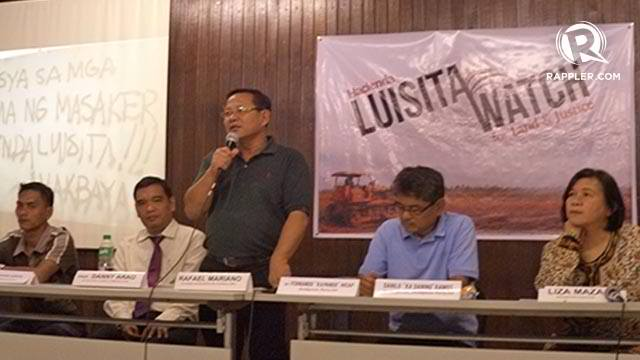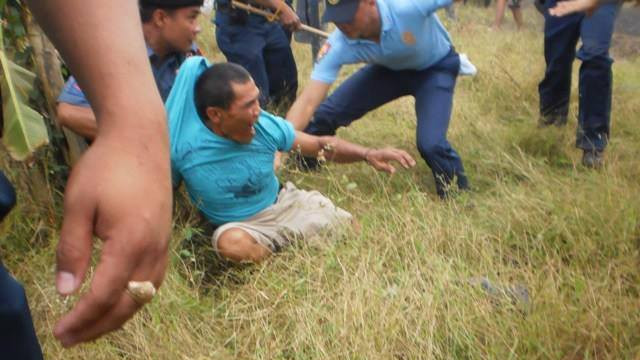SUMMARY
This is AI generated summarization, which may have errors. For context, always refer to the full article.

MANILA, Philippines – Luisita Watch, a newly-formed network of people’s organizations and advocates supporting Hacienda Luisita farmworkers, hit the Supreme Court decision upholding most provisions of the Cybercrime Law, including online libel.
During its official launch on Thursday, February 20, at the University of the Philippines-Diliman, Luisita Watch said that online libel will suppress the “narrative of the oppressed, hence the poor farmworkers are further disenfranchised.”
According to the group, advocates have turned to social media to help amplify the voice of the farmworkers. But the Internet, which they considered a new advocacy arena, is now under threat.
“Ang usapin ng Luisita halos sa Internet lang lumalabas, at ngayon may online libel pa,” Ranmil Echanis of Unyon ng mga Manggagawa sa Agrikultura (UMA) said. (The issue of Luisita usually appears on the Internet, but now there’s an online libel.)
The Supreme Court on February 18 ruled that online libel, a contentious issue during the oral arguments, is constitutional. (READ: ‘Libel gone is best-case scenario for SC cybercime ruling’)
Untold stories
Luisita Watch highlighted in the forum the story of 99-year old Apong Maria, one of the many farmworkers whose unheard voices the group wanted to share through social media.
Apong Maria first worked in Hacienda Luisita at age 15; her daily wage then was 50 centavos. After 84 years of labor, her pay has only increased by P9, almost the same as the wage of her children who also became farmworkers.
In the 1930s, her family moved to Luisita, where they planted food crops and cultivated forests. Since 1957, when the Cojuangcos acquired the 6,000-hectare landholding, the land where farmworkers planted rice for their own consumption was taken away, according to Apong Maria.
Apong Maria remains hopeful the highly-contested agricultural land will be returned to them.
“Ang Hacienda Luisita ay pag-aari ng mga magsasaka at hindi ng mga Cojuangco. Sinanla lang ito nang 10 taon at hindi na nila sinauli, inagaw na nila,” Apong Maria said. (Farmers, not the Conjuangcos, own Hacienda Luisita. It was only mortgaged for 10 years, but they never returned it, they took it.)
Unrest in Hacienda Luisita has recently escalated despite the distribution of land titles to farmer beneficiaries in October 2013. In December 2013, crops in Balete village were bulldozed in an attempt to force farmers out of the land, according to Alyansa ng mga Manggagawa sa Asyenda Luisita (AMBALA).
A poster from the Cojuangco-owned Tarlac Development Corporation (TADECO) marked the area: “Development soon to rise.”

Role of alternative media
Luisita Watch argued that the “escalating unrest” in Luisita is rooted in the Department of Agrarian Reform’s (DAR) failure to implement “genuine land distribution.” The group also decried the “violent methods” used in forcing the farmworkers out of their lands.
But according to the group which includes UP professors, the side of the farmers are often not tackled by mainstream media nor aired to a wider audience.
“Ang mga ganitong balita ay hindi madalas lumalabas sa dyaryo o TV, kaya itinayo ang Luisita Watch,” UP Sociology professor Sarah Raymundo said. (These kinds of stories are rarely featured on newspapers or TV, this is why Luisita Watch was launched.)
The challenge is how to tell the stories such as Apong Maria’s through alternative means like social media.
“We need to use social media to make an issue viral without trivializing it. We make the message strong and compelling so that more people will know what is happening, and they will pass it on,” UP journalism professor Danilo Arao said.
Arao emphasized that their advocacy does not end within social media alone. There is a need to inspire action beyond the Internet, he said.
Arao also urged the public to oppose the Cybercrime Law’s provision on online libel, saying that the law has a “chilling effect” on individuals like the farmworkers of Luisita. – Rappler.com
Add a comment
How does this make you feel?
There are no comments yet. Add your comment to start the conversation.